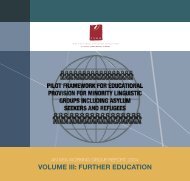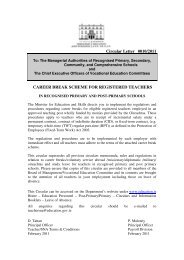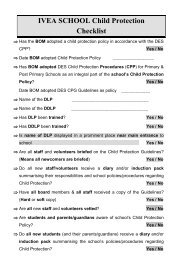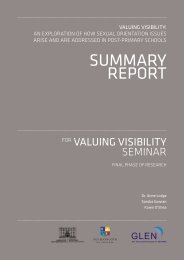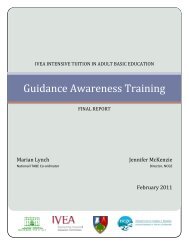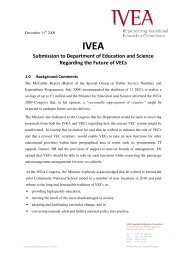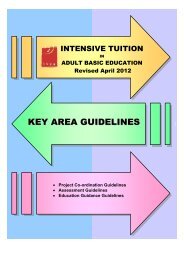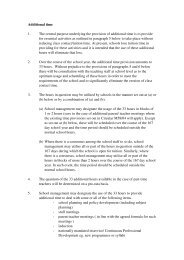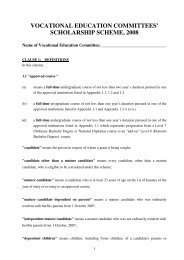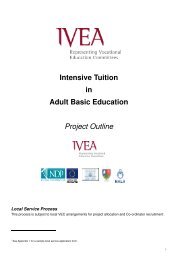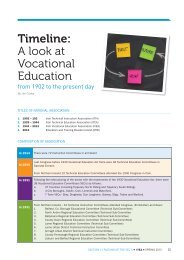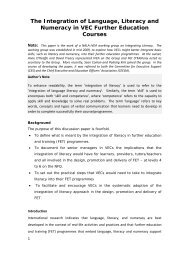Download File - IVEA
Download File - IVEA
Download File - IVEA
You also want an ePaper? Increase the reach of your titles
YUMPU automatically turns print PDFs into web optimized ePapers that Google loves.
<strong>IVEA</strong> Recommendation:<br />
It must be acknowledged that bilingual/EAL learners may come from<br />
different cultures where different educational attitudes and practices<br />
prevail. Schools and teachers should recognise that all students bring<br />
their own strengths to learning derived from their cultural identity and<br />
previous learning and life experiences. Schools need to be open to<br />
and creative in utilising these experiences to the students’ benefit.<br />
<strong>IVEA</strong> recommends that each school provides parents/guardians with a<br />
comprehensive overview of how the school operates, its policy and ethos;<br />
the curriculum etc. In case of conflicting values, it is recommended that<br />
schools engage in dialogue to reach agreement. For communication to<br />
be effective, it may be necessary to provide a translator.<br />
5.5 PROMOTING STUDENT INVOLVEMENT<br />
The CDU report A Whole School Approach to Interculturalism and<br />
Inclusion makes the following recommendations in the context of<br />
supporting and empowering students:<br />
• Ways should be explored to give students greater voice in school<br />
decision-making, including ongoing review of Student Council<br />
structures by schools to assess their impact and to allow for<br />
more involvement of younger students and those of minority<br />
background.<br />
• Appropriate induction and monitoring for all students’ social and<br />
academic welfare should take place.<br />
• Mentoring programmes should be considered, with the possible<br />
development of peer-mentoring. This needs careful planning,<br />
training and ongoing guidance and evaluation<br />
• Work that builds self-esteem, values diversity and supports<br />
understanding of interculturalism and anti-racism should be<br />
carried out with students, both as distinct programmes<br />
embedded in the different subject areas and approached<br />
periodically through cross-curricular theme and project work.<br />
• Consideration should be given to how students who have<br />
experienced and are still affected by trauma can be supported<br />
through pastoral care, counselling and monitoring by the<br />
psychological, health and social welfare services in tandem<br />
with the school.<br />
• All sectors dealing with student needs will benefit from training in<br />
anti-racism and interculturalism.<br />
5.6 PROMOTING PARENTAL INVOLVEMENT<br />
The CDU report A Whole School Approach to Interculturalism and<br />
Inclusion makes the following recommendations in the context of<br />
supporting and empowering parents:<br />
• Different ways of involving parents in the development of the<br />
school and in the celebration of school activities should<br />
be explored.<br />
• Schools should be pro-active in their support of parents<br />
from minority backgrounds and engage in active dialogue with<br />
representatives of minority linguistic groups in order to increase<br />
awareness of issues of common interest.<br />
• There is a need for effective structures to facilitate communication<br />
with parents from minority communities. Financial resources<br />
should be provided for translation of key information pertaining<br />
to school-life and for the services of interpreters (where it is<br />
deemed necessary) as supports to students and parents with<br />
limited English.<br />
Part of the CDU’s project involved consultations with a range of<br />
stakeholders in Maynooth Post Primary school. The findings<br />
suggest the following initiatives to promote parental involvement in<br />
the school:<br />
Suggestions for greater parental involvement arising from<br />
CDU/Maynooth PP Survey Report 49 :<br />
• An open day for new students and parents to ease students into<br />
first year;<br />
• Open days for students to display their work;<br />
• More parent-teacher meetings;<br />
• More inclusive parent-teacher meetings;<br />
• The establishment of a committee to deal solely with academic<br />
issues (not fund-raising issues);<br />
• More home-school liaison;<br />
• More information to issue from school (particularly in respect of<br />
future plans);<br />
• Newsletter from management should be more concise;<br />
• Occasions other than religious ceremonies to give parents an<br />
opportunity to visit the school;<br />
• Get all (parents, teachers and students) involved in school plays,<br />
debates, drama, art, etc.;<br />
• Sunday barbeque and sports day for families – to promote<br />
interaction and raise funds;<br />
• Meetings and social events for parents of minority linguistic students;<br />
• Information and resources to be provided to staff to enable them<br />
to relate better to parents of minority linguistic students;<br />
• School to facilitate local parents in getting to know the parents of<br />
new students;<br />
• Language support for parents to promote communication and<br />
integration;<br />
• Organise a multi-cultural awareness day for parents and school;<br />
• More interdenominational services.<br />
22<br />
49<br />
Maynooth Post Primary Survey: pp. 9-12. The survey comprises part of Research Report compiled by Maírín Kenny on behalf of the CDU as part of the CDU project A Whole School Approach to Interculturalism and Inclusion,<br />
CDVEC: 2002 (unpublished).



